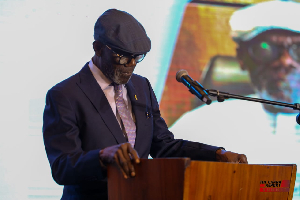Accra, Nov. 7, GNA - A three-day international conference on "Coastal Zones of Sub-Saharan Africa" opened on Monday with a call on the participants to adopt defensive measures to maintain shorelines being over-exploited.
Mr Gyeshika Adombire Agambilla, Deputy Minister of Environment and Science, welcoming the about 40 participants from the Ghana, UK, Nigeria, Cote d'Ivoire, Senegal and Liberia, said Sub-Saharan Africa would need to develop strategies to prevent the destruction of the coastline.
"We need to move beyond rhetoric and take action if we are to avert future human and natural disasters by placing good environmental management at centre stage," he said.
The Minister noted that coastal communities were already under stress, hence the need to harness the potential nature by managing the area's coastal resources in a sustainable manner.
He said the recent hurricanes in the Americas should alert the sub-region on the need to improve the plans and designs of our settlements along the coast, saying, "We need to address our waste disposal practices to avert polluting our coastal ecosystem." Mr Agambilla mentioned flood-frequency probabilities, erosion, rising water tables and salt water intrusion as among the most important bio-geophysical effects from society, adding that such activities lead to the direct loss of economic, ecological, cultural and subsistence values through loss of land, infrastructure and coastal habitats. He called on the Ministries of Tourism, Harbours and Railways and Local Government to liase with his sector Ministry to improve the coastal situation
Mr. Jake Obetsebi-Lamptey, Minister of Tourism and Modernization of the Capital City, said tourism was perhaps the most vulnerable to the threats climatic change, explaining that lessons from tourism intensive coastal towns of South East Asia after the Tsunami and the News Orleans were there to learn from.
He bemoaned the glaring negative features of the coastal town and said they threatened any economic emancipation from such territories. Mr Obetsebi-Lamptey, however, noted that the tourism sector had gone a long way with the implementation of the sector's strategic action plan which aimed at attracting one million tourists in the next two to five years.
Pupils from Morning Star School in Accra, in a presentation, called for a large-scale use of solar energy.
Professor Lord Hunt from the University College of London and President of the Advisory Committee on the Protection of the Sea pledged continual support for the programme.
He said climate change was one of the greatest challenges and political imperatives facing the world now, adding that the industrialized world has largely created man-made climate change and had a duty to take the lead in tackling the problems it presented.
General News of Monday, 7 November 2005
Source: GNA












